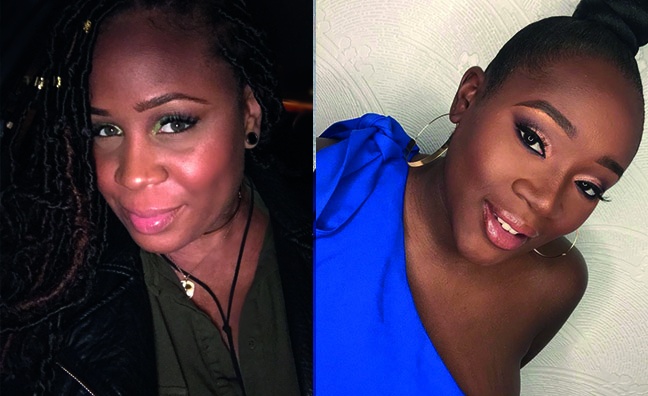In the new issue of Music Week, we speak to a host of key names from the black music community to look at the impact the #TheShowMustBePaused initiative had on the industry.
So far this week, MOBO founder Kanya King has appealed for change, Ray Blk shared her experiences as a rising artist, Ferocious Talent CEO Kwame Kwaten called on the music industry to do more, publicist Curtis Sharkey shared his personal reflections and Live Nation's Alexandra Ampofo called on her generation to mobilise. Here, Virgin EMI's Afryea Henry-Fontaine (above, left) and Metropolis' Whitney Boateng (above, right) discuss organising #TheShowMustBePausedUK.
Whitney Boateng: Afryea and I are working in unison with the US campaign. We were having conversations with different people in the industry, black and white, and I started a group chat with another black music executive and we just decided to add a few people to see how we could talk about rallying for change.
With people’s reactions, it’s definitely hard to differentiate between the performative and the caring but, regardless it was brilliant that we had the chance to stop, to educate and pause. Black people are in mourning all over the world because we just saw one of our brothers murdered on telly. Mentally, the majority of us are not OK. Yes, we did need a pause, but this is not a one-day issue. We must continue to do the work. A lot of companies have said they value black lives, now I need to see follow-up action. Education is brilliant, but action is more important. There’s room for philanthropy, there’s room for black promotion, that all needs to be addressed and changed. It doesn’t stop with a hashtag. I want to see gradual steps to black lives actually mattering.
This doesn’t stop with a hashtag
Whitney Boateng
The Black Out signified a pause before continuation of change, not before going back to mistreating your black staff, underpaying them, not valuing their input. It was a pause to think about how we are going to start to change.
The black part of the music industry has become so important, but for me and others that I’ve spoken to, we’re still not in the rooms to discuss things regarding our culture. And if we are, we’re not always being listened to, which is ludicrous, but also upsetting.
The good thing about everybody posting online is that they now have to be held accountable. The majority of companies have said this is something they’re concerned about and they’re here to support us. The change will be permanent, we want change that will last for years and be generational.
Afryea Henry-Fontaine: The expectation for us as black executives is to push through, to keep going. I didn’t feel able to do that, so I reached out to HR and the head of communications as well as the president at my label to say, ‘I’m not OK and this is why, and I’d really like to hear what can be done to support other black staff who I assume are feeling the same way.’ That’s where it kicked off. They were very receptive and understanding and wanted to support me and other black colleagues.
As our statement said, Black Out Tuesday was a day to reflect and re-engage with the black community and open minds. Within my company, myself and one of the other members of the team, Fay Hoyte, put together a list of resources that was shared wide across the company, to spark important conversations, necessary conversations, uncomfortable conversations. Now we’ve paused and started those conversations, there is a space for dialogue to really affect change and that’s the part that is so important. The pause is the first step, it’s important that lasting change happens and that companies remain engaged with their black staff about these issues and don’t just think, ‘Oh it’s one day, we’ve done that, we’ve ticked the box, now we go back to normal’.
We’re in it for the long haul and it’s going to be a gradual process
Afryea Henry-Fontaine
It was important for us to take a breath, take a moment and not have to sit on Zoom calls, not have to engage outside... It was a moment to take care of ourselves, because we’ve not been able to do that, seeing all this murder and injustice. That was the primary goal initially, but it’s about everybody understanding, both the industry and us as black executives across the board, that last week was about the pause, today is about planning and strategising, and tomorrow and in the future, that’s when we implement the change. It’s not going to happen in 24 hours or a month. We’re in it for the long haul and it’s going to be a gradual process. I want to be super-clear that we can’t speak for all black women in the industry; we’re not a monolith. A lot of stereotypes have been pushed out about black women, that we’re too opinionated, angry, sassy... All these terms are apportioned to us before we walk into a room. That suggests that we’re a monolith. We’re not a monolith, all of us are different, we have different characteristics and we bring different things to the table. That’s one of the main things, understanding that we are all different, we are all of value and our perspectives and contributions will be different and should be valued equally. There’s this underlying assumption that we’re all the same and that’s a big challenge.
This is a historic moment and change is inevitable. But it will be about willingness, continued dialogue and ensuring that we hold these companies accountable. It’s not a quick fix, but I’m definitely optimistic that change will come.
* For more on #TheShowMustBePaused see the new issue of Music Week, available in print and digital editions now. To make sure you can access Music Week wherever you are, sign up to our digital issue by clicking here.









